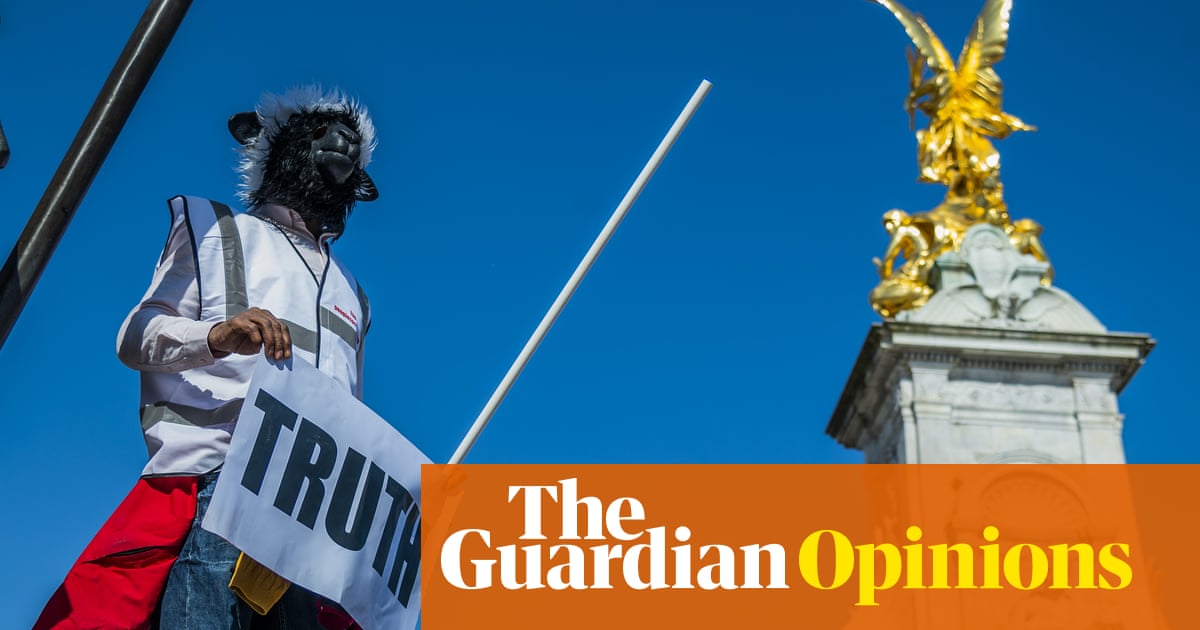The Covid crisis suits rightwing media personalities as they monetise fear

The pandemic has upended all our lives, leaving many of us frightened and confused. But if the weekend’s angry anti-lockdown protests reflected genuine pain in the community, they also showed how, in a complicated international emergency, rightwing grifters have seized an opportunity.
If you look for Covid truth on Telegram and Gab, you’ll uncover the online equivalent of a crowded outdoor market, dominated by shouting stall holders.
Don’t buy big pharma’s lies – but do buy some supermushroom protein! Try this cleanse diet! Check out this muscle supplement! Invest in Bitcoin! Subscribe to podcast X or channel Y or vlog Z!
The hustle comes, most obviously, from rightward-moving “wellness” advocates, people long accustomed to merging conspiracism and commerce. In the recent years, Qanon has spread like a disease through the New Age milieu, so that “natural health” entrepreneurs who once might have hailed the Dawning of Aquarius now rail with equal fervour against George Soros and the Great Reset.
But the distinctive character of the so-called freedom movement also reflects a broader evolution of conservatism, a political philosophy degenerating into an overt racket.
In a now classic essay for the Baffler, Rick Perlstein traces the sensibility of the modern right back to the direct mail fundraisers of the 1960s, who recognised the financial potential of the paranoic style after Barry Goldwater’s presidential nomination.
They found they could generate huge revenue for conservative clients using “robotype” machines to target the believers of the far right with lurid warnings about communist plots, UN takeovers and the persecution of Christians, calamities that could, apparently, be averted by means of a small donation.
The technology of solicitation improved, the mailing lists grew longer, and the money rolled in.
In 1992, far-right firebrand Pat Buchanan famously addressed the Republican National Convention, telling delegates they were embroiled in a titanic struggle.
“It is,” he said, “a cultural war as critical to the kind of nation we shall be as the cold war itself. For this war is for the soul of America.”
The speech marked a fresh strategy for Republicans, one in which lachrymose appeals to conservative values would win back those voters dismayed by neoliberal economics.
“We need to let them know we know how bad they’re hurting,” Buchanan explained. “They don’t expect miracles of us, but they need to know we care.”
Culture war injected the techniques of mail-order solicitation (where miracles and performative empathy had long coexisted) deep into the veins of the mainstream right. The money game and the political game became, Perlstein argues, two facets of the one operation, as evidenced by pitches “in which the ideological and transactional share the exact same vocabulary, moral claims and cast of heroes and villains.”
Consider channels such as Alex Jones’s Infowars, where the presentations of apocalyptic conspiracies segue seamlessly into plugs for Infowars Life Brain Force Plus, Infowars Life Super Male Vitality, Infowars Live Liver Shield and an array of similar potations.
The more mainstream Fox News might not market its own branded snake oil but it employs the same methods, convincing befuddled boomers that only Tucker Carlson stands between them and the New Black Panthers, and then selling advertisers access to a loyal audience of terrified suburbanites.
At some level, the neoliberal turn made us all into entrepreneurs. These days, progressive activists tout podcasts, too. But because the right openly extolls capitalism, it’s far more suited to the monetisation of everything, as the emergence of Donald J Trump – a Brain Force president – proved.
In 2016, the Republicans showed they could eventually unite behind a candidate who made no distinction at all between his business and political interests. In a sense, the American right got the leader it deserved: as Paul Waldman says, Trump’s presidency revealed that “so many people at so many levels within the Republican Party [were] grifters, lunatics, or both.”
All over the world, conservatives took note.
After Trumpism, every far-right conspiracist sees himself as an entrepreneur on the rise, one controversy away from establishing his own Infowars or Breitbart.
It’s not just the fringe, either.
In the past, ambitious young conservatives might have joined the Liberal party, assiduously lobbied for preselection and then toiled anonymously for decades on the backbench, hoping one day to earn Cabinet positions.
Today, such people can abandon Bob Menzies for PT Barnum, build their followers on YouTube or Facebook, and land sweet gigs on Sky News.
There’s no real downside. In 2021, rightwing media personalities exert more influence than most MPs.
Better still, the new pundits feel no responsibility for anything. Why would they? Their success depends not on providing solutions but on ginning up, by any means necessary, the conservative base.
The hallucinatory culture war they deploy probably can’t deliver electoral majorities. But that doesn’t matter. It reliably generates the online engagement on which media monetisation relies.
The Covid crisis suits such hucksters down to the ground. As a medical emergency foregrounding scientific expertise, it enables them to re-use all the old tropes from climate denialism. They can tout quack cures, mock vaccinations, and blame know-it-all doctors.
By denouncing the coercion of lockdowns, authoritarians can masquerade as libertarians. Without any need to maintain consistency, they can imply one day that Covid doesn’t exist and the next day blame China for creating it.
Their patter is their product – and they’ll tell the desperate and the delusional anything at all so long as they can make bank by doing so.
Most of these people understand full well what’s at stake. They know that, when they spread misinformation and fantasy, some of us may die.
But that’s a sacrifice they’re willing to make.
Nothing personal, you understand – it’s just business.


